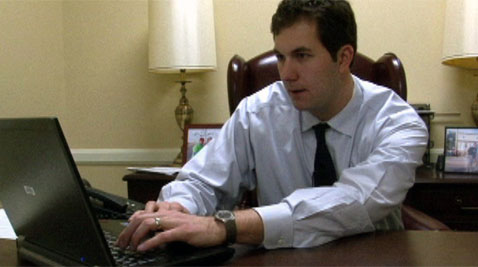ANNAPOLIS – In Maryland, playing fantasy sports for cash and prizes could make you a criminal.
Technically, because of ambiguities in state law, Marylanders are prohibited from collecting cash and prizes in fantasy sports competitions. Delegate John Olszewski Jr. is hoping HB 7 will change that.
The bill would exempt certain fantasy sports competitions from current state gambling regulations, allowing Maryland residents the ability to enter and collect prizes. Currently, some fantasy league organizers like ESPN and CBS, prohibit Marylanders from participating when cash and prizes are at stake.
Video by Whitney Harris/CNS-TV
Trying to exempt fantasy sports from gambling regulations has been attempted in other states. This will be the third time in Maryland.
In 2009 and 2010, Olszewski, a Democrat from Dundalk, introduced bills entitled, “AN ACT concerning Criminal Law – Betting, Wagering, and Gambling – Fantasy Competition.”
“I thought it was an easy fix,” Olszewski said. “But obviously it has been more difficult than I thought.”
The bill has never even received a vote.
“Third time’s a charm,” Olszewski said.
The problem stems from a 2006 state attorney general’s office opinion on poker declaring the three elements of gambling to be: consideration, chance and prize (all of which must be present).
Fantasy sports generally include elements of all three, which is why even your buddy’s fantasy football league could be illegal if it involves cash and prizes, though no one gets prosecuted.
In 2008, Olszewski says the Department of Legislative Services determined fantasy sports not to be gambling because the outcome is determined, in part, by a person’s skill in selecting real players to fictitious teams, and not the type of chance seen in slot machines.
In fantasy sports, teams are comprised of real athletes. Points are then accumulated by the athletes’ actual performance. The team with the most points wins.
The Fantasy Sports Trade Association, an organization that promotes fantasy sports interests and also retains a lobbyist in Washington, estimates 29.6 million play fantasy sports in the U.S., generating around $800 million.
Olszewski is among them. In fact, it was his league’s fine print precluding Maryland residents from collecting prizes, which spurred him to action.
Olszewski is not the only government official to advocate for his fantasy sports-playing constituents.
In 2010, Louisiana State Rep. Thomas Carmody, a Republican, pushed a bill to exempt certain fantasy games from state anti-gambling laws. According to USA Today, Carmody drew up his bill after learning a childhood friend was barred from collecting a T-shirt as winnings from an online fantasy baseball game.
That legislation ultimately failed in a 73-16 vote in the state’s House of Representatives.
Olszewski hopes to gain the support of the Fantasy Sports Trade Association and fantasy sports organizers like ESPN and CBS. He also hopes the interest piqued by the current bill is enough to push it over the top.

